Research Laboratories
Access to and use of the Department's research laboratories is authorized according to the procedures described below.
► General rules for laboratory access department of psychology 2025 (available in italian)
The BiCApP Research Center (www.bicapp.it) is dedicated to the development of Mobile and Wearable technology. Specifically, it conducts scientific research in the field of human factors and human interaction with these technologies and has acquired specific expertise in the development and testing of apps, games, and wearables aimed at improving people's quality of life and well-being over time.
The center occupies an area of approximately 35 m² and houses several workstations equipped with state-of-the-art PCs. Additionally, there is a dedicated laboratory technician present at the center.
Various wearable devices (smart Swatch and trackers) are available at the center, along with several tablets and a prototypical platform for mobile app development.
To gain access, permission must be requested from the laboratory technician. The technician will facilitate access through the Booked system on the website: http://calendariolab.psicologia.unimib.it
Head: Prof. Emanuele Preti
The BraveNewWord psycholinguistics lab is dedicated to researching how adult speakers process new words, integrating knowledge from cognitive psychology, computational linguistics, and neuroscience. The lab adopts an interdisciplinary approach that enables the exploration of the semantic aspects of language acquisition and comprehension.
Research activities include the use of computational models to simulate the mechanisms of new word learning, supported by empirical experiments and advanced neuroscientific techniques such as EEG. These tools allow for the observation of brain activity during linguistic processing, revealing crucial insights into the strategies used by the brain to infer meanings from unfamiliar linguistic stimuli.
Head: Prof. Marco Marelli
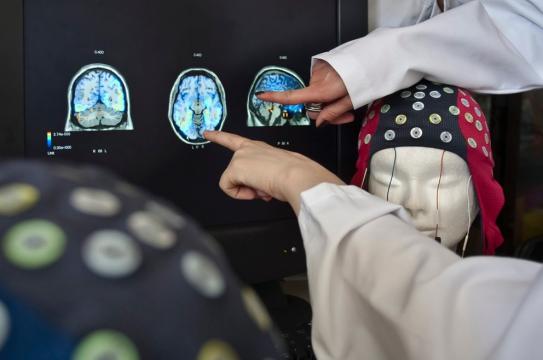
The laboratory is dedicated to performing research that requires the recording and analysis of electrical brain activity, evoked potentials (VEPs and AEPs) and event-related potentials (ERPs) in healthy adult participants.
The laboratory is equipped with an acoustically shielded Faraday cage, EEG/ERP acquisition and analysis system from ANT (Enschede, Netherlands) with digital amplifier, Polhemus digitiser and 2 128-channel headphones from Electrocap.
To gain access, permission must be obtained from the laboratory manager. The manager will make the booking system accessible via Booked at the site:
http://calendariolab.psicologia.unimib.it
Director: Prof. Alice Mado Proverbio
Location: U6, Floor 3, Room 3107
Website: https://bicoccaerplab.wordpress.com/
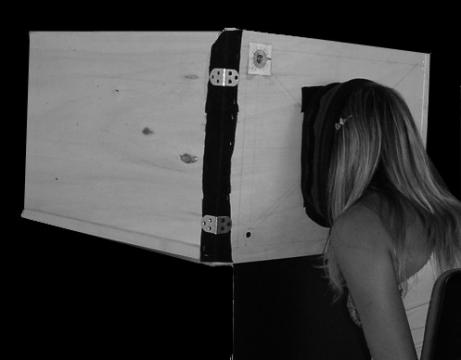
The Laboratory is dedicated to research in perception and psychophysics.
Luce e Colore is a narrow room (about 3.5x5 metres), without windows and painted entirely in black. There are two workstations, but due to their layout, it is not advisable to conduct multiple experiments simultaneously.
The laboratory is equipped with a new-generation PC with programmes such as MatLab and Pyhton for designing experiments, an older Macintosh for running SuperLab (a very simple, but effective programme for presenting stimuli and collecting data), several CRT monitors and an LCD monitor suitable for conducting psychophysics experiments. Various types of beacons, including two LED beacons, are available for conducting experiments relating to how material qualities and light are perceived. A ‘mini-laboratory’ can be set up for visual perception studies that require precise control of lighting conditions. It is also possible to conduct stereopsis experiments using a mirror stereoscope, as well as to conduct haptic experiments. Finally, the laboratory is equipped with a photometer, which can only be used after consultation with the laboratory manager.
To gain access, permission must be obtained from the laboratory manager. The manager will make the booking system accessible via Booked at the site:
http://calendariolab.psicologia.unimib.it
Director: Prof. Daniele Zavagno
Location: U6, Floor 3, Room 3095
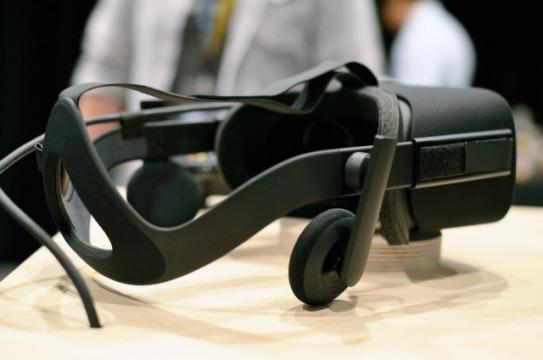
Laboratories 3091 and 3103 serve as well-equipped spaces within the MIBTEC research center (www.mibtec.it). These two areas are dedicated to data collection using Virtual Reality (VR) and Augmented Reality (AR) paradigms, which involve limited movement spaces and focus on the utilization of virtual environments through stationary Head Mounted Displays. The laboratories offer a unique opportunity to study human behavior within simulated real-life contexts, which can be controlled and modified.
Laboratory 3091 spans approximately 25m² and contains several cubicles for conducting experiments with individual participants. It is equipped with cutting-edge PCs (2x HP OMEN L30) featuring Intel i9 processors and Nvidia Geforce 3090 graphics cards, providing exceptional rendering performance. The lab also boasts Meta OCULUS visors and controllers (Rift and Go). Furthermore, it houses an HP OMEN X Workstation with an Intel i7 processor and Nvidia 1080 graphics card. The laboratory's hardware is regularly updated with specific expansions to meet evolving research needs.
Access to Laboratory 3091 requires authorization from the laboratory manager, Prof. Gabbiadini Alessandro. The manager facilitates booking through the online panel available at http://calendariolab.psicologia.unimib.it.
Location: U6, Floor 3, Room 3091
Laboratory 3103, covering an area of approximately 30m², comprises two dedicated spaces: a room for testing Augmented Reality applications and an area housing a static driving simulator with TRUST steering wheel and pedal controls. Similar to Laboratory 3091, Lab 3103 is equipped with analogous HP OMEN workstations.
Access to Laboratory 3103 also requires permission from the laboratory manager, Prof. Bricolo Emanuela. The manager arranges accessibility via the online panel found at http://calendariolab.psicologia.unimib.it.
Location: U6, Floor 3, Room 3103
Both laboratories are also suitable for software development, particularly for VR environments created using Unity and C#. The computational power provided by the workstations also supports complex data analysis and execution of resource-intensive Matlab scripts.
The Mibtec U9 Center Laboratories for the study of VR/AR/MR technologies consist of four sub-laboratories, each equipped with specific resources. All laboratories adhere to the same rules and reservation procedures (available in Italian).
1. Mibtec Haptics
This laboratory enables experimentation in the field of AR/VR/XR using equipment for somatosensory/pain stimulation and the detection of behavioral and physiological measures (HR, ECG, EKG, EGG, EEG, EDA, respiration rate). The following equipment is available in the lab: Ultraleap Stratos, Geomagic Touch X, Thermal-Pain Stimulator, Biopac biosignal detection system, Thermographic camera, Arduino robotic arm, and two VR headsets. The workspace is divided into two high-performance HP Omen 30L desktop stations.
Head: Prof. Alberto Gallace
Technicians: Dr. Luca Pieri, Dr Sharon Romano, Dr. Emanuele Sapio
Location: Room U9 903
2. Mibtec Virtualizer
The Virtualizer laboratory is specifically dedicated to data collection and the development of research paradigms involving immersive VR. It includes an HP Omen 30L desktop PC with two monitors and a dedicated VR headset. Additionally, a VR treadmill, the Cyberith Virtualizer, is connected to the station, enabling natural movements during VR experiences.
Head: Dr. Daniele Romano
Technicians: Dr. Luca Pieri, Dr Sharon Romano, Dr. Emanuele Sapio
Location: Room U9 903
3. Mibtec Drive
The Drive laboratory features a vehicle driving simulator with triple screens connected to a high-performance desktop PC. The simulator includes a professional Fanatec steering wheel, pedals, and gearshift. Its realism is further enhanced by an inertial MotionSystems platform that, along with Fanatec devices, provides tactile and vestibular feedback based on virtual vehicle movements. The setup can also be used in immersive mode, replacing the triple screens with a VR headset.
Head: Prof. Emanuela Bricolo
Technicians: Dr. Luca Pieri, Dr Sharon Romano, Dr. Emanuele Sapio
Location: Room U9 R006
4. Mibtec Cave 1 and 2
The CAVE (Cave Automatic Virtual Environment) occupies two separate rooms within the U9 903 laboratory. Both installations measure 3x3x2.5m and operate with individual setups, including 4 HP workstations, 5 Barco projectors, 4 (Cave 2) or 8 (Cave 1) Optitrack infrared tracking and motion-capture systems, surround sound, and radio-frequency glasses. The two CAVEs have the ability to communicate with each other, opening possibilities for the development of paradigms involving mediated interactions in semi-immersive VR environments.
Head: Prof. Alberto Gallace
Technicians: Dr. Luca Pieri, Dr Sharon Romano, Dr. Emanuele Sapio
Location: Room U9 903
The laboratory is dedicated to performing experiments that require the recording and analysis of movement.
The laboratory has a SMART System with 6 infrared cameras controlled by a PC to estimate the coordinates of refractive markers placed on the subject’s body. The system makes it possible to record and analyse the kinematics of the movement of the body segment on which the markers have been placed.
To gain access, permission must be obtained from the laboratory manager. The manager will make the booking system accessible via Booked at the site:
http://calendariolab.psicologia.unimib.it.
Director: Prof. Lucia Sacheli
Location: U6, Floor 3, Room 3111
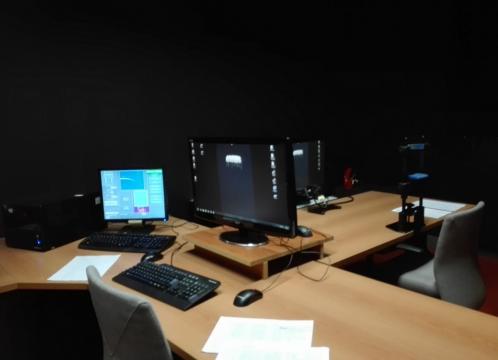
The laboratory is dedicated to experiments that require the use of ocular motility measurements.
Research conducted in the laboratory studies eye movement in decision-making, attention, perception, language comprehension and reading experiments in order to investigate the factors that implicitly and automatically affect and/or influence our response to stimuli during task performance.
The workstation includes a set-up consisting of two PCs: the first permits the generation and presentation of visual/auditory stimuli, while the second manages the camera and the equipment that allows eye movement to be recorded (EYElink 1000). The two PCs communicate in real time to allow synchronous recording of events.
To gain access, permission must be obtained from the laboratory manager. The manager will make the booking system accessible via Booked at the site:
http://calendariolab.psicologia.unimib.it
Director: Prof. Francesca Foppolo
Location: U6, Floor 3, Room 3108
The laboratory is dedicated to experimental neuropsychology studies in individuals without neurological damage and in patients with brain injuries and disturbances of sensory/motor or cognitive functions.
Various equipment is available to conduct the following activities:
- Computer-assisted multisensory stimulation (visual, tactile, vibratory, pain and acoustic) and video projection
- Recording of neurophysiological parameters using Biopac equipment and portable instruments (skin conductance, cardiovascular parameters, respiration)
- Study of body illusions (rubber hand illusion, mirror box)
- Transcranial electrical stimulation (tDCS)
- Stimulation through virtual reality systems or portable augmented reality (head-mounted display)
To gain access, permission must be obtained from the laboratory manager. The manager will make the booking system accessible via Booked at the site:
http://calendariolab.psicologia.unimib.it
Director: Dr. Daniele Romano
Location: U6, Floor 3, Room 3102
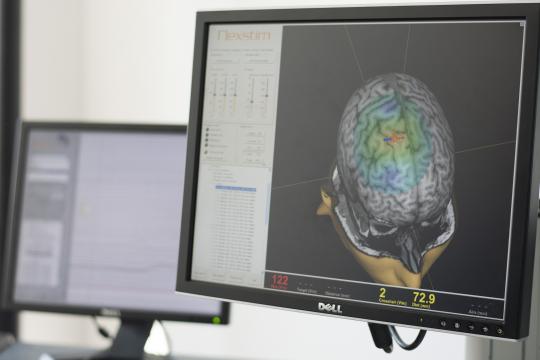
The laboratory is dedicated to the use of neuromodulation techniques (TMS/tDCS/tACS), brain activity recording (EEG) and neuropsychological assessment (VLSM + neuropsychological questionnaires) to study the interface between brain and cognition in various areas: from face processing to language, attention and consciousness. It is also possible to conduct studies aimed at evaluating the functional change induced by neuromodulation.
The laboratory comprises two rooms with an rTMS, an integrated TMS-EEG nexstim system and three tDCS.
To gain access, permission must be obtained from the laboratory manager. The manager will make the booking system accessible via Booked at the site:
http://calendariolab.psicologia.unimib.it
Director: Prof. Leonor Romero Lauro
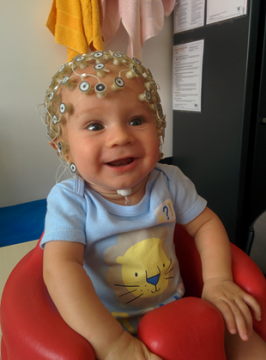
Work in the laboratory aims to investigate the origins and development of human cognition using both behavioural paradigms based on visual attention span detection and electrophysiological techniques.
Electroencephalography (EEG) allows us to record the spontaneous electrical activity produced by our brain. The EEG system in the laboratory uses an electrode headset, which is placed on the child’s head. The recording is done in a non-invasive manner, while the child watches images or short films on a PC screen or listens to sounds. Electromyography (EMG) is used to record muscular electrical activity. For example, it is used to study the movements of the muscles involved in exhibiting emotional expressions through the application of small sensors on the face.
To gain access, permission must be obtained from the laboratory manager. The manager will make the booking system accessible via Booked at the site:
http://calendariolab.psicologia.unimib.it
Director: Prof. Chiara Turati
Location: U6, Floor 3, Room 3093
Lab webpage https://bicoccababylab.wixsite.com/mindevlab
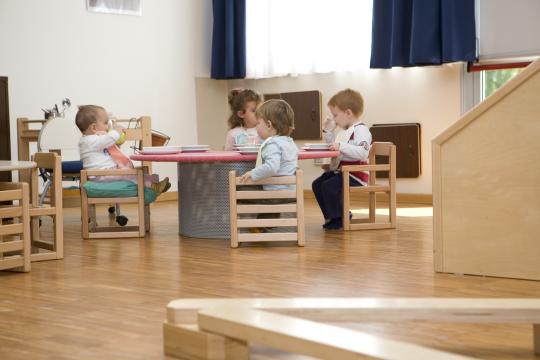
The laboratory is used to investigate different areas of child development, with particular reference to the communicative-linguistic, cognitive and socio-affective domains.
The lab consists of two adjoining rooms (a control room and an observation room) connected by a one-way mirror. It is equipped to allow observational sessions that can be fully video-recorded, enabling the subsequent classification and measurement of the behaviour being analysed.
To gain access, permission must be obtained from the laboratory manager. The manager will make the booking system accessible via Booked at the site:
http://calendariolab.psicologia.unimib.it
Director: Prof. Nicoletta Salerni
Location: U6, Floor 3, Room 3092
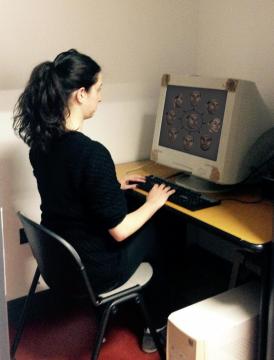
This laboratory is dedicated to experiments in the psychology of uni- and multi-sensory perception, visual attention and spatial cognition.
The laboratory is divided into three small spaces: two insulated by walls and accessed by an independent door (without windows), and a third formed by the remaining space and equipped with a soundproof booth.
There are therefore three different workstations, even allowing two experiments to be carried out simultaneously.
To gain access, permission must be obtained from the laboratory manager. The manager will make the booking system accessible via Booked at the site:
http://calendariolab.psicologia.unimib.it
Director: Prof. Roberta Daini
Location: U6, Floor 3, Room 3105

The laboratory is dedicated to performing experiments that require the recording and analysis of movement performed on a haptic manipulandum and of movement associated with writing and drawing, as well as the presentation of visual stimuli in a semi-immersive environment (hemispherical screen).
The laboratory is equipped with a computer, a haptic manipulandum connected to a screen to present visual stimuli, a hemispherical screen and a large digitising table.
The haptic manipulandum consists of a robotic arm (MOOG FCS hapticMaster) that actively controls the movement of the effector used by the subject (normally the arm) and passively records the movement with great precision. The robotic arm can be programmed in MatLab.
The hemispherical screen (ELUMENS Vision Station) allows 180-degree vision and is equipped with a prism projection system that allows the projection to be adapted to the screen and must be connected to a computer that generates the visual stimuli for projection.
A large digitising graphics table is also available for studying writing, drawing and two-dimensional graphic design in general.
Scripts for running experiments must be custom-written for each project.
To gain access, permission must be obtained from the laboratory manager. The manager will make the booking system accessible via Booked at the site:
http://calendariolab.psicologia.unimib.it
Director: Prof. Emanuela Bricolo
This laboratory is used to study the processes that determine human behaviour. In the laboratory, experimental studies are conducted on attitudes, intergroup relations and the cognitive processes underlying the formation of impressions of individuals and groups. Most of the studies conducted in the laboratory use computer-based behavioural methodologies and relate to social categorisation and the processes that determine stereotypes, prejudice and discrimination.
Three workstations, each equipped with a PC and video camera. The PCs are equipped with software for studying reaction times (e.g., Inquisit, e-prime, mouse tracker).
To gain access, permission must be obtained from the laboratory manager. The manager will make the booking system accessible via Booked at the site:
http://calendariolab.psicologia.unimib.it
Director: Prof. Marco Brambilla
Location: U6, Floor 3, Room 3114
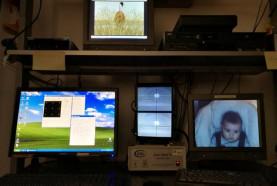
Work in the laboratory focuses on the study of infant cognition and perceptual development in the first year of life and at pre-school age through recording of eye movements, visit attention spans and electrophysiological indices aimed at measuring the body’s level of psychophysiological activation.
Eye movements are recorded using an Eye Tracker system with remote optics, which records the infrared signal reflected by the pupil during the observation of images projected on the screen and superimposes the position of the pupil on the images themselves, thereby enabling measurements of eye movement latency and the duration of visual fixations within specific areas of interest.
Recording of psychophysiological activity takes place through the measurement of skin conductance, i.e. the continuous changes in the electrical characteristics of the skin as a result of changes in body perspiration, carried out by applying small sensors to the child’s skin.
To gain access, permission must be obtained from the laboratory manager. The manager will make the booking system accessible via Booked at the site:
http://calendariolab.psicologia.unimib.it
Director: Prof. Viola Macchi Cassia
Location: U6, Floor 3, Room 3094
Website: https://bicoccababylab.wixsite.com/mindevlab
The PsychoSCoPe (Psychometrics of Social Cognition and Personality) laboratory is used for the measurement and study of implicit and explicit attitudes, personality dimensions, associative and propositional learning, and their underlying processes and behavioural correlates. Most of the studies conducted in the laboratory use computer-based scripts.
It consists of eight separate workstations, each equipped with a PC with software installed for studying reaction times (i.e. Inquisit) and a number of response devices (joystick, response box).
To gain access, permission must be obtained from the laboratory manager. The manager will make the booking system accessible via Booked at the site:
http://calendariolab.psicologia.unimib.it
Director: Dr. Giulio Costantini
Location: U6, Floor 3, Room 3110

The laboratory is dedicated to conducting behavioural experiments in psycholinguistics and cognitive psychology.
It is equipped with 4 testing stations with Windows and/or Linux partitions, and a computer for personal use by the test operator. The testing stations are equipped with software for collecting chronometric data (Psychtoolbox, E-Prime, PsychoPy) and are optimised for precise time control in the presentation of experimental stimuli. The laboratory also includes a desk that can be used for experiments conducted with your own instruments (e.g. a laptop).
To gain access, permission must be obtained from the laboratory manager. The manager will make the booking system accessible via Booked at the site:
http://calendariolab.psicologia.unimib.it
Director: Prof. Marco Marelli
Location: U6, Floor 3, Room 3035
The laboratory is dedicated to conducting experiments in clinical psychology and psychopathology that require the presentation of stimuli (images, audio, video) and the recording of behavioural responses (e.g. reaction times) on topics such as, for example, the processing of facial or prosodic emotions, the study of attention with respect to emotional stimuli and the use of implicit measures (e.g. the Implicit Association Test).
The lab is equipped with four PCs, one of them latest-generation, for the development of 3D VR environments (C# and Unity), viewers and OCULUS Facebook controllers, for conducting studies with virtual reality paradigms.
To gain access, permission must be obtained from the laboratory manager. The manager will make the booking system accessible via Booked at the site:
http://calendariolab.psicologia.unimib.it
Director: Prof. Emanuele Preti
Location: U6, Floor 3, Room 3121
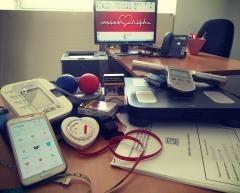
The laboratory is dedicated to research activities in the field of psychology and communication applied to health, including, for example, the study of psychological and lifestyle factors in the course of chronic and complex diseases, the study of the effectiveness of tailored communication protocols, the development of apps and digital initiatives for the promotion of healthy lifestyles.
The laboratory is equipped with 2 Windows PCs and the following instruments:
- semi-automatic blood pressure monitors
- body fat scales
- measuring tape for measuring body, waist, hips, chest, arms
- wearable devices for measuring heart rate.
To gain access, permission must be obtained from the laboratory manager. The manager will make the booking system accessible via Booked at the site:
http://calendariolab.psicologia.unimib.it
Director: Prof. Patrizia Steca
Location: U6, Floor 3, Room 3045
The laboratory is dedicated to conducting qualitative and quantitative research in the field of social psychology, including, for example, the detection of knowledge, attitudes and values, as well as experimental studies investigating the cognitive processes underlying attitudes, stereotypes and prejudices, inter-individual and inter-group behaviour and decision-making.
It is equipped with four computer stations with video cameras that allow video recording of individual and group interviews. Available software are: E-Prime, Inquisit and MATLAB for programming and managing experiments and data acquisition; SPSS for statistical data analysis: T-Lab for automated analysis of textual data.
To gain access, permission must be obtained from the laboratory manager. The manager will make the booking system accessible via Booked at the site:
http://calendariolab.psicologia.unimib.it
Director: Prof. Cristina Baldissarri
Location: U6, Floor 3, Room 3145
The laboratory is dedicated to experiments in experimental psychology and is particularly appropriate for behavioural measures with presentation of short visual stimuli (e.g. priming paradigms).
It is equipped with two Windows workstations with Acer monitors that can reach refresh rates of 120 Hz. The main software for administering experiments is already installed.
To gain access, permission must be obtained from the laboratory manager. The manager will make the booking system accessible via Booked at the site:
http://calendariolab.psicologia.unimib.it
Director: Prof. Carlo Reverberi
Location: U6, Floor 3, Room 3131